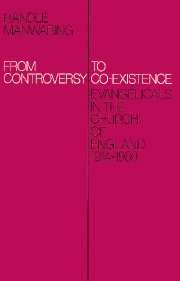Book contents
- Frontmatter
- Contents
- Acknowledgements
- Preface
- 1 Into battle
- 2 The defensive years
- 3 Through the Waste Land
- 4 Continuing nadir
- 5 The turning tide
- 6 Towards the conversion of many
- 7 Flood-tide of Evangelism
- 8 Anatomy of Evangelicalism
- 9 The Fundamentalist issue
- 10 The hard facts of Evangelicals and unity
- 11 The Honest to God debate
- 12 Liturgical debates
- 13 Charismatic differences
- 14 Keele – a watershed
- 15 Evangelical identity – a problem
- Notes
- Index
10 - The hard facts of Evangelicals and unity
Published online by Cambridge University Press: 18 September 2009
- Frontmatter
- Contents
- Acknowledgements
- Preface
- 1 Into battle
- 2 The defensive years
- 3 Through the Waste Land
- 4 Continuing nadir
- 5 The turning tide
- 6 Towards the conversion of many
- 7 Flood-tide of Evangelism
- 8 Anatomy of Evangelicalism
- 9 The Fundamentalist issue
- 10 The hard facts of Evangelicals and unity
- 11 The Honest to God debate
- 12 Liturgical debates
- 13 Charismatic differences
- 14 Keele – a watershed
- 15 Evangelical identity – a problem
- Notes
- Index
Summary
The problems of unity sufficiently exercised the mind of Geoffrey Fisher, the Archbishop of Canterbury, that he asked both Catholics and Evangelicals to produce documents, declaring their standpoints, hopefully with the result that common ground might be established and differences, if possible, resolved. After the publication of Catholicity (London, 1947) came the evangelical response The Fulness of Christ (S.P.C.K., 1950), with a foreword by the archbishop. With the perspectives of evangelical history it is interesting to note that the writers included the principals of four theological colleges, Ridley Hall, London College of Divinity which became St John's, Nottingham (Donald Coggan), Wycliffe Hall and St John's, Durham, also theologians Henry Chadwick and Geoffrey Lampe plus Max Warren. The chairman was the Archdeacon of Sheffield, D. E. W. Harrison and all were members of the Evangelical Fellowship for Theological Literature (1942-72).
The book referred to the ‘conflict left by the Reformation’, and to that time when ‘the champions of the old order would have nothing to do with the new insights’. The Fulness of Christ made clear statements of the evangelical doctrines of grace and faith, justification and sanctification – it was an exemplary, confessional work. ‘The weight of historic precedent is authoritative’, the book declared ‘but it is not conclusive: the final criterion is the Word of God.’ Along the path to unity hopes were raised of resolving the conflict between Evangelicals and Catholics but there were no obvious long-term results.
- Type
- Chapter
- Information
- From Controversy to Co-ExistenceEvangelicals in the Church of England 1914–1980, pp. 123 - 133Publisher: Cambridge University PressPrint publication year: 1985



